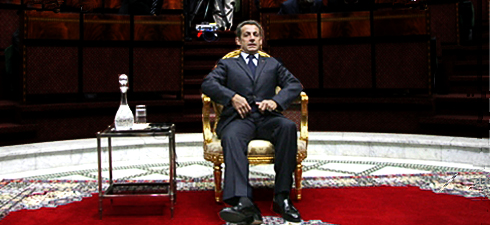Politics is a cruel business. Victory and defeat, triumphs and downfalls, often follow in rapid succession. In our day all can be lost in the space of a few weeks. Latest case in point: Angela Merkel, Germany’s chancellor. In late March she was still queen of Europe. Merkel dominated the spring summit in Brussels. She dictated the main terms of the rescue package for the cash-strapped Greeks. Her initial strategy was to do nothing. And the other states had to tow the line. Six weeks later the erstwhile hegemon looks like she’s been left high and dry. The tactics came to nothing. Her power is eroding, at home and in Europe. Last weekend, when the EU states jump-started a gigantic emergency plan to save the euro, France ran the operation – in close consultation with Italy and other Mediterranean countries.
The latest events mark a turning-point. The financial crisis and rescue parachute for the eurozone are going to change the EU from top to bottom. It will bear more of a French and less of a German stamp. Not only because French president Nicolas Sarkozy emerged on the spot as far-sighted crisis manager, while Merkel was obsessing with elections in the German province. Politics in Europe will be more à la française in future. And the methods, maybe even the institutions, will take on a French cast.
Sarkozy getting closer to his goal
At one fell swoop, Germans last weekend surrendered positions they’d considered sacrosanct until recently. Things are shaping along the lines drawn in Paris: so the euro Stability Pact, a German invention, is now outmoded. What is currently keeping the single currency on an even keel isn’t the pact, but the €110 billion rescue package for the Greeks plus the €750 billion parachute for other potentially skint states. Even the no-bailout rule has been de facto thrust aside. The Germans had been toting that clause around like a holy monstrance these past few months to ward off any objections from Karlsruhe [seat of the German constitutional court]. Suchlike qualms, however, were alien to the French, who in the end prevailed.
Sarkozy is also getting closer to his goal of forging a European economic government out of the 16 eurozone states. It was that group that passed the key resolutions over the weekend. The EU Commission only gets to fetch and carry now. But the point is that the entire eurozone is waking up to the fact that it won’t work anymore without political leadership and much tighter economic policy coordination. The Germans would have none of that in the past, but now Europe is going to get economic governance, whether on a formal or informal footing. The EU has no alternative if it is to remedy the structural defects in the single currency.
Germany failed the big stress test
The European Central Bank has also taken a French turn. It was initially conceived on the model of the German Bundesbank – as an independent institution. Then on the weekend it suddenly let itself get roped into the deal in Brussels. It even declared its willingness, in a pinch, to buy up junk bonds from euro states in freefall. So much for its independence. The Central Bank is now an accessory to politics. That isn’t just a novel development, it’s a revolution.
Germans shouldn’t be naïve and think things will flutter back into our pattern once the storm on the stock markets has subsided and Europe can put paid to the financial crisis. Just one weekend sufficed to break a whole slew of taboos. When our EU partners begin mulling the consequences of the euro crisis and drawing up new rules for the monetary union, Germans won’t have much to say for their approach to Europe, which failed the big stress test. And they provided the proof themselves – by signing off on the gigantic rescue plan for the monetary union.
Was this article useful? If so we are delighted!
It is freely available because we believe that the right to free and independent information is essential for democracy. But this right is not guaranteed forever, and independence comes at a cost. We need your support in order to continue publishing independent, multilingual news for all Europeans.
Discover our subscription offers and their exclusive benefits and become a member of our community now!












